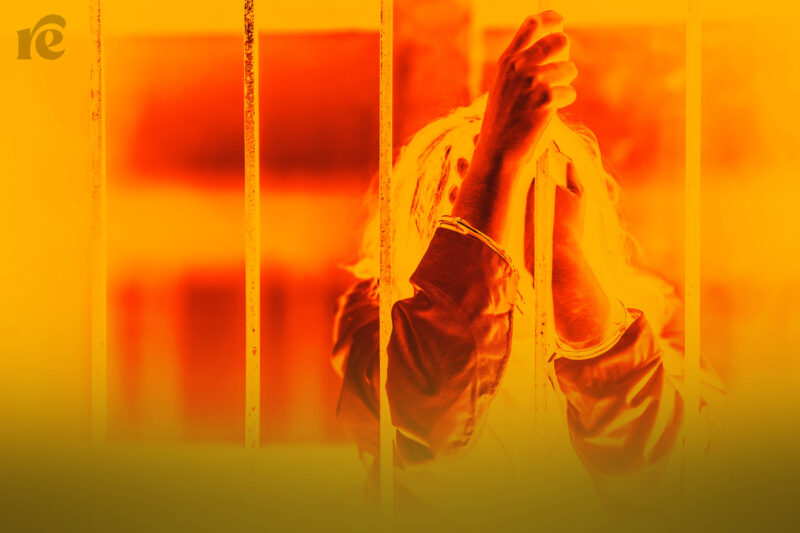What We Get Wrong About Abortion Criminalization
As an abortion researcher, I know firsthand how laws are abused to punish people who self-manage their abortions.

Over the summer, a 19-year-old Nebraska girl was sentenced to three months in jail and two years of probation for allegedly managing her own abortion to escape parenting with an abusive partner when she was 17. On September 22, her mom was sentenced to two years in prison for helping her access that care. In a post-Roe America, this case has been a media spectacle—and they’re getting it completely wrong.
While this may be the first time you are hearing about someone facing jail time for ending their own pregnancy, this sadly isn’t new. I’ve spent most of the last decade researching and advocating against the criminalization—investigation, arrest, and prosecution—of people for pregnancy outcomes and abortions managed outside of the medical system. Today, these self-managed abortions are only illegal in one state, but prosecutors and law enforcement deliberately misuse or abuse existing laws to prosecute people for their pregnancy outcomes.
I’ve documented 61 cases across 26 states from 2000 to 2020 in which people were criminally investigated or arrested for allegedly self-managing their own abortion or helping someone else do so. At the same time, more people than ever before are considering self-managing their abortions, and over half of people use abortion pills to end their pregnancies safely.
With these parallel developments, it’s essential that people understand exactly how the laws are abused to punish self-managed abortions. The media must also learn this lesson to avoid contributing to abortion stigma by publishing articles that include identifying information of people facing criminalization that create an inescapable public record of an already degrading experience.
Despite headlines stoking fear of tools like period tracking apps, the criminalization of self-managed abortion doesn’t have to wait for new forms of high-tech spying. In fact, among cases in our research, law enforcement was most often contacted by health-care professionals, social workers, and acquaintances. This opens the door for overzealous police and prosecutors to abuse existing criminal laws not meant to apply to allegations of self-managed abortion. Ultimately, the majority of cases proceeded and most often concluded in someone pleading guilty. This is unsurprising given that most cases in the criminal system are resolved without a trial.
I have to believe that the power of community can overcome this culture of surveillance and anti-abortion extremism that is reproducing distrust.
To put it plainly, this criminalization of people self-managing an abortion is a direct result of the biases baked into our current criminal system—one that is racist, classist, and seeks to dehumanize marginalized people at every turn. In the United States, when people are poor and can’t afford food for their families, they are criminalized for neglect instead of being given access to meals and resources to support their family. Parents who use drugs or receive medication to treat addiction have had their children taken away—temporarily or permanently—despite medical guidance. And, like the mother and daughter in Nebraska, people who self-manage their abortion and those who help them are sometimes criminalized for taking their health care and their futures into their own hands.
The research revealing the reality of people being prosecuted for their pregnancy outcomes isn’t new; the increased fear we now have of each other post-Roe is. Every time someone is punished for their abortion, more people are reluctant to seek help from their communities. Others are scared to help those dearest to them because helping a loved one could land them in court. And in the end, that is abortion opponents’ goal: to keep us scared, isolated, and weighing the risk of criminalization against helping those we love access basic health care.
But I find hope in remembering that we have ways to keep our communities safe. We can learn how to keep our searches for abortions care safe and private so police can’t weaponize our data. Health-care and mental health providers can ensure they understand the law so they don’t wrongfully open up their patients to criminalization. We can learn about what we actually have to share with health-care providers when our pregnancies end to reduce our chances of being wrongfully reported to law enforcement. Defense attorneys can be trained to better represent people who end up facing criminalization for pregnancy outcomes or abortion. News outlets can refuse to parrot law enforcement enacting state violence against people for their health-care decisions and instead treat people with dignity. And we can all work to unravel abortion stigma so personal relationships can’t be used against people making the right decision for themselves and their communities.
🧵Yesterday a 19yo in Nebraska was sentenced for self-managing an abortion. The case is riddled in state abuse of power but the media on it has also been disturbing. I’m asking media to do SO much better & consider the people being harmed in these cases when doing their reporting
— Laura Huss (@mlaurahuss) July 21, 2023
I have to believe that the power of community can overcome this culture of surveillance and anti-abortion extremism that is reproducing distrust. Because when someone makes the decision to end their pregnancy, they should be able to lean on their support systems and never have to fear punishment.
If anyone is in legal trouble because of their abortion or has questions about the law, If/When/How’s Repro Legal Helpline can help. Their legal services are free and confidential. Call (844) 868-2812 or visit reprolegalhelpline.org.
